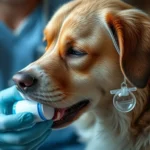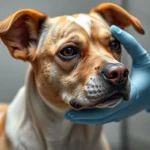
Puppy health is a critical aspect of responsible pet ownership. Just like human infants, puppies are particularly vulnerable to a variety of puppy diseases and illnesses. Early detection is crucial for effective treatment and prevention, which can significantly impact your puppy’s quality of life. This article aims to provide you with insights into common diseases and illnesses that affect puppies, including their symptoms, prevention strategies, and treatment options. Remember, consulting a veterinarian is essential for accurate diagnosis and care.
Understanding Puppy Health
The Importance of Regular Vet Visits
Regular veterinary check-ups are an essential part of maintaining your puppy’s health. Puppies undergo rapid growth and development, making them susceptible to various conditions. A veterinarian can monitor this growth, provide vaccinations, and offer guidance on nutrition and exercise.
Vaccination schedules are designed to protect puppies from serious diseases. Core vaccines, such as those for parvovirus, distemper, and rabies, are crucial in the early stages of a puppy’s life. These vaccines help boost their immune systems and prevent deadly infections.
Common Symptoms of Illness in Puppies
Puppies cannot vocalize their discomfort as effectively as adult dogs, making it vital for owners to recognize signs of distress. Some common symptoms of puppy diseases and illnesses include:
- Vomiting and diarrhea
- Lethargy or decreased activity
- Loss of appetite
- Changes in behavior, such as increased aggression or withdrawal
- Coughing or sneezing
Being vigilant about your puppy’s behavior can help you catch early signs of illness and seek veterinary care promptly.
Common Puppy Diseases and Illnesses
Infectious Diseases
Parvovirus
Parvovirus is one of the most severe and contagious diseases affecting puppies. It primarily attacks the gastrointestinal tract, leading to severe dehydration and potentially death.
Symptoms: Common signs include vomiting, diarrhea (often bloody), and lethargy. Affected puppies may also exhibit a lack of interest in food and water.
Prevention: Vaccination is the most effective way to prevent parvovirus. Maintaining good hygiene and avoiding places where infected dogs have been can also reduce risk.
Distemper
Distemper is a viral disease that affects a puppy’s respiratory, gastrointestinal, and nervous systems. It is highly contagious and can be fatal.
Symptoms: Signs of distemper include fever, coughing, nasal discharge, and neurological problems such as seizures.
Prevention: Vaccination is key to preventing distemper. Keeping your puppy away from unvaccinated dogs can also reduce exposure.
Kennel Cough
Kennel cough is a highly contagious respiratory disease often seen in puppies, especially in crowded settings like shelters or dog parks.
Symptoms: The primary sign is a persistent cough, often described as a honking sound. Some puppies may also experience a runny nose or mild fever.
Prevention: Vaccination and minimizing exposure to crowded places can help prevent kennel cough. Good hygiene practices in shared spaces are also beneficial.
Non-infectious Diseases
Hip Dysplasia
Hip dysplasia is a genetic condition that affects the hip joint’s development, leading to arthritis and pain as the puppy grows.
Symptoms: Puppies with hip dysplasia may exhibit limping, difficulty getting up, or reluctance to jump or climb stairs.
Treatment options: Management of hip dysplasia may include medication for pain relief, weight management, or surgery in severe cases.
Allergies
Puppies can suffer from various allergies, including food allergies and environmental allergies (like pollen or dust mites).
Symptoms: Allergic reactions can manifest as itching, redness of the skin, or gastrointestinal upset (vomiting or diarrhea).
Treatment options: Treatment may involve dietary changes, antihistamines, or other medications as prescribed by a veterinarian.
Behavioral Health Issues
Separation Anxiety
Separation anxiety is a common behavioral issue in puppies, often stemming from their need for companionship.
Symptoms: Puppies may show signs like excessive barking, destructive behavior, or urinating in the house when left alone.
Treatment options: Training techniques, such as crate training and gradual acclimatization to alone time, can help. In some cases, medication may be recommended.
Obsessive-Compulsive Behaviors
Puppies can develop obsessive-compulsive behaviors, which may manifest as repetitive actions or excessive grooming.
Symptoms: Common signs include repetitive actions such as tail chasing or excessive licking.
Treatment options: Behavioral modification strategies and veterinary guidance can help manage these conditions.
Preventive Care
Vaccination Protocols
Understanding the vaccination protocols for puppies is vital. Core vaccines are essential for all puppies, while non-core vaccines may be recommended based on individual lifestyle and risk factors.
Staying on schedule with vaccinations protects your puppy from various diseases. Always follow your veterinarian’s recommendations regarding vaccination timing and boosters.
Proper Nutrition and Diet
A balanced diet is crucial for your puppy’s health. Puppies have different nutritional needs than adult dogs, requiring a diet higher in protein and calories to support growth.
Consider reputable puppy food brands that offer complete and balanced nutrition. Consult your veterinarian for recommendations tailored to your puppy’s specific needs.
Regular Exercise and Socialization
Regular physical activity is essential for a puppy’s physical and mental health. Exercise helps prevent obesity and encourages healthy bone and muscle development.
Socializing your puppy with other dogs and people is equally important. It can help reduce anxiety and promote good behavior as they grow. Puppy classes are an excellent way to provide socialization and training experiences.
When to Consult a Veterinarian
Recognizing Emergency Signs
It’s crucial to recognize critical symptoms that require immediate veterinary attention. Some emergency signs include:
- Difficulty breathing
- Severe vomiting or diarrhea
- Unresponsiveness or lethargy
- Seizures
- Signs of pain or distress
If you notice any of these symptoms, contact your veterinarian or an emergency animal clinic right away.
Routine Check-ups vs. Emergencies
Understanding the difference between routine health checks and emergencies can help you respond appropriately. Regular check-ups are important for monitoring your puppy’s growth and health, while emergencies necessitate immediate action.
If your puppy shows any concerning signs or symptoms that deviate from their normal behavior, do not hesitate to seek veterinary advice.
Conclusion
Awareness of puppy diseases and illnesses is essential for any responsible puppy owner. Recognizing symptoms early and understanding prevention strategies can make a significant difference in your puppy’s health and well-being. Regular veterinary visits are vital for monitoring health, administering vaccinations, and providing guidance on nutrition and care. Staying informed and proactive ensures that your puppy can grow up healthy, happy, and full of life. Always remember the importance of consulting your veterinarian for any health concerns regarding your furry companion.









